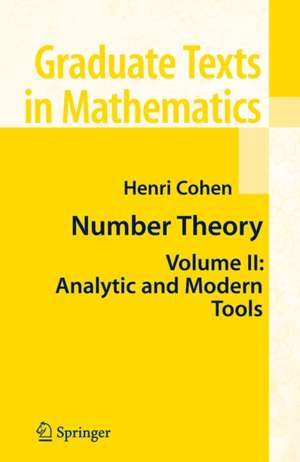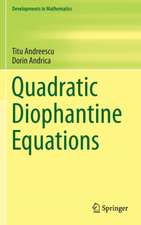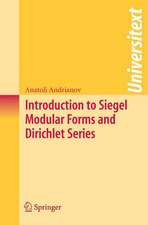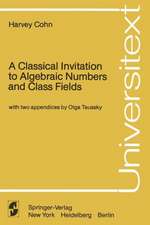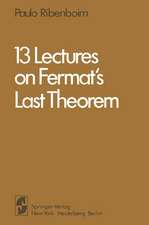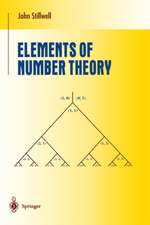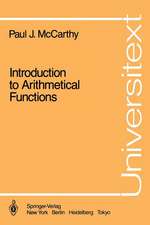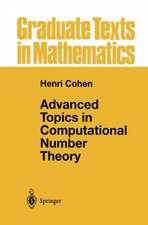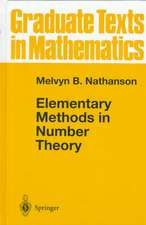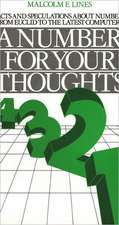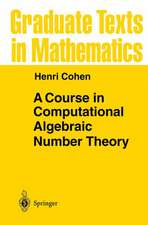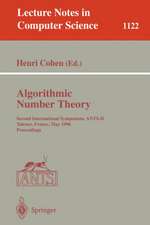Number Theory: Volume II: Analytic and Modern Tools: Graduate Texts in Mathematics, cartea 240
Autor Henri Cohenen Limba Engleză Hardback – 23 mai 2007
| Toate formatele și edițiile | Preț | Express |
|---|---|---|
| Paperback (2) | 440.39 lei 6-8 săpt. | |
| Springer – 19 noi 2010 | 440.39 lei 6-8 săpt. | |
| Springer – 25 noi 2010 | 443.10 lei 6-8 săpt. | |
| Hardback (2) | 477.56 lei 6-8 săpt. | |
| Springer – 23 mai 2007 | 477.56 lei 6-8 săpt. | |
| Springer – 23 mai 2007 | 483.71 lei 6-8 săpt. |
Din seria Graduate Texts in Mathematics
-
 Preț: 402.89 lei
Preț: 402.89 lei - 17%
 Preț: 528.68 lei
Preț: 528.68 lei -
 Preț: 337.46 lei
Preț: 337.46 lei -
 Preț: 383.86 lei
Preț: 383.86 lei - 17%
 Preț: 366.57 lei
Preț: 366.57 lei - 17%
 Preț: 398.97 lei
Preț: 398.97 lei -
 Preț: 355.83 lei
Preț: 355.83 lei -
 Preț: 411.84 lei
Preț: 411.84 lei -
 Preț: 404.48 lei
Preț: 404.48 lei -
 Preț: 289.88 lei
Preț: 289.88 lei - 17%
 Preț: 365.80 lei
Preț: 365.80 lei - 17%
 Preț: 359.45 lei
Preț: 359.45 lei - 15%
 Preț: 488.70 lei
Preț: 488.70 lei - 13%
 Preț: 357.76 lei
Preț: 357.76 lei -
 Preț: 407.88 lei
Preț: 407.88 lei - 13%
 Preț: 352.49 lei
Preț: 352.49 lei - 13%
 Preț: 358.86 lei
Preț: 358.86 lei - 13%
 Preț: 393.48 lei
Preț: 393.48 lei - 11%
 Preț: 351.00 lei
Preț: 351.00 lei - 17%
 Preț: 359.58 lei
Preț: 359.58 lei -
 Preț: 350.46 lei
Preț: 350.46 lei - 8%
 Preț: 567.37 lei
Preț: 567.37 lei -
 Preț: 399.74 lei
Preț: 399.74 lei -
 Preț: 498.91 lei
Preț: 498.91 lei - 20%
 Preț: 571.26 lei
Preț: 571.26 lei - 15%
 Preț: 546.59 lei
Preț: 546.59 lei -
 Preț: 498.69 lei
Preț: 498.69 lei - 15%
 Preț: 354.39 lei
Preț: 354.39 lei -
 Preț: 313.11 lei
Preț: 313.11 lei - 13%
 Preț: 427.40 lei
Preț: 427.40 lei - 17%
 Preț: 363.60 lei
Preț: 363.60 lei -
 Preț: 340.19 lei
Preț: 340.19 lei - 17%
 Preț: 364.47 lei
Preț: 364.47 lei - 17%
 Preț: 366.47 lei
Preț: 366.47 lei - 17%
 Preț: 366.07 lei
Preț: 366.07 lei -
 Preț: 247.59 lei
Preț: 247.59 lei - 17%
 Preț: 367.70 lei
Preț: 367.70 lei - 13%
 Preț: 356.80 lei
Preț: 356.80 lei - 17%
 Preț: 398.78 lei
Preț: 398.78 lei - 17%
 Preț: 398.51 lei
Preț: 398.51 lei - 17%
 Preț: 496.65 lei
Preț: 496.65 lei - 13%
 Preț: 361.80 lei
Preț: 361.80 lei - 15%
 Preț: 482.97 lei
Preț: 482.97 lei -
 Preț: 402.02 lei
Preț: 402.02 lei - 17%
 Preț: 366.57 lei
Preț: 366.57 lei - 20%
 Preț: 449.74 lei
Preț: 449.74 lei -
 Preț: 380.35 lei
Preț: 380.35 lei
Preț: 477.56 lei
Nou
Puncte Express: 716
Preț estimativ în valută:
91.38€ • 97.72$ • 76.19£
91.38€ • 97.72$ • 76.19£
Carte tipărită la comandă
Livrare economică 18 aprilie-02 mai
Preluare comenzi: 021 569.72.76
Specificații
ISBN-13: 9780387498935
ISBN-10: 0387498931
Pagini: 596
Ilustrații: XXIII, 596 p.
Dimensiuni: 155 x 235 x 33 mm
Greutate: 0.97 kg
Ediția:2007
Editura: Springer
Colecția Springer
Seria Graduate Texts in Mathematics
Locul publicării:New York, NY, United States
ISBN-10: 0387498931
Pagini: 596
Ilustrații: XXIII, 596 p.
Dimensiuni: 155 x 235 x 33 mm
Greutate: 0.97 kg
Ediția:2007
Editura: Springer
Colecția Springer
Seria Graduate Texts in Mathematics
Locul publicării:New York, NY, United States
Public țintă
ResearchCuprins
Analytic Tools.- Bernoulli Polynomials and the Gamma Function.- Dirichlet Series and L-Functions.- p-adic Gamma and L-Functions.- Modern Tools.- Applications of Linear Forms in Logarithms.- Rational Points on Higher-Genus Curves.- The Super-Fermat Equation.- The Modular Approach to Diophantine Equations.- Catalan’s Equation.
Recenzii
From the reviews:
"Cohen (Université Bordeaux I, France), an instant classic, uniquely bridges the gap between old-fashioned, naive treatments and the many modern books available that develop the tools just mentioned … . Summing Up: Recommended. … Upper-division undergraduates through faculty." (D. V. Feldman, CHOICE, Vol. 45 (5), January, 2008)
"The book deals with aspects of ‘explicit number theory’. … The central theme … is the solution of Diophantine equations. … It combines an interesting ‘philosophy’ of the subject with an encyclopedic grasp of detail. The extension of the author’s reach via the contributed chapters is a good idea. Perhaps it is the start of a trend, as the subject grows more and more. … It will undoubtedly be mined by instructors for their graduate courses, particularly for the purpose of including some recently-proved content." (R. C. Baker, Mathematical Reviews, Issue 2008 e)
“This is the second volume of a highly impressive two-volume textbook on Diophantine analysis. … readers are presented with an almost overwhelming amount of material. This … text book is bound to become an important reference for students and researchers alike.” (C. Baxa, Monatshefte für Mathematik, Vol. 157 (2), June, 2009)
"Cohen (Université Bordeaux I, France), an instant classic, uniquely bridges the gap between old-fashioned, naive treatments and the many modern books available that develop the tools just mentioned … . Summing Up: Recommended. … Upper-division undergraduates through faculty." (D. V. Feldman, CHOICE, Vol. 45 (5), January, 2008)
"The book deals with aspects of ‘explicit number theory’. … The central theme … is the solution of Diophantine equations. … It combines an interesting ‘philosophy’ of the subject with an encyclopedic grasp of detail. The extension of the author’s reach via the contributed chapters is a good idea. Perhaps it is the start of a trend, as the subject grows more and more. … It will undoubtedly be mined by instructors for their graduate courses, particularly for the purpose of including some recently-proved content." (R. C. Baker, Mathematical Reviews, Issue 2008 e)
“This is the second volume of a highly impressive two-volume textbook on Diophantine analysis. … readers are presented with an almost overwhelming amount of material. This … text book is bound to become an important reference for students and researchers alike.” (C. Baxa, Monatshefte für Mathematik, Vol. 157 (2), June, 2009)
Textul de pe ultima copertă
The central theme of this graduate-level number theory textbook is the solution of Diophantine equations, i.e., equations or systems of polynomial equations which must be solved in integers, rational numbers or more generally in algebraic numbers. This theme, in particular, is the central motivation for the modern theory of arithmetic algebraic geometry. In this text, this is considered through three aspects.
The first is the local aspect: one can do analysis in p-adic fields, and here the author starts by looking at solutions in finite fields, then proceeds to lift these solutions to local solutions using Hensel lifting. The second is the global aspect: the use of number fields, and in particular of class groups and unit groups. This classical subject is here illustrated through a wide range of examples. The third aspect deals with specific classes of equations, and in particular the general and Diophantine study of elliptic curves, including 2 and 3-descent and the Heegner point method. These subjects form the first two parts, forming Volume I.
The study of Bernoulli numbers, the gamma function, and zeta and L-functions, and of p-adic analogues is treated at length in the third part of the book, including many interesting and original applications.
Much more sophisticated techniques have been brought to bear on the subject of Diophantine equations, and for this reason, the author has included five chapters on these techniques forming the fourth part, which together with the third part forms Volume II. These chapters were written by Yann Bugeaud, Guillaume Hanrot, Maurice Mignotte, Sylvain Duquesne, Samir Siksek, and the author, and contain material on the use of Galois representations, points on higher-genus curves, the superfermat equation, Mihailescu's proof of Catalan's Conjecture, and applications of linear forms in logarithms.
The book contains 530 exercises of varying difficulty from immediate consequences of the main text to research problems, and contain many important additional results.
The first is the local aspect: one can do analysis in p-adic fields, and here the author starts by looking at solutions in finite fields, then proceeds to lift these solutions to local solutions using Hensel lifting. The second is the global aspect: the use of number fields, and in particular of class groups and unit groups. This classical subject is here illustrated through a wide range of examples. The third aspect deals with specific classes of equations, and in particular the general and Diophantine study of elliptic curves, including 2 and 3-descent and the Heegner point method. These subjects form the first two parts, forming Volume I.
The study of Bernoulli numbers, the gamma function, and zeta and L-functions, and of p-adic analogues is treated at length in the third part of the book, including many interesting and original applications.
Much more sophisticated techniques have been brought to bear on the subject of Diophantine equations, and for this reason, the author has included five chapters on these techniques forming the fourth part, which together with the third part forms Volume II. These chapters were written by Yann Bugeaud, Guillaume Hanrot, Maurice Mignotte, Sylvain Duquesne, Samir Siksek, and the author, and contain material on the use of Galois representations, points on higher-genus curves, the superfermat equation, Mihailescu's proof of Catalan's Conjecture, and applications of linear forms in logarithms.
The book contains 530 exercises of varying difficulty from immediate consequences of the main text to research problems, and contain many important additional results.
Caracteristici
Unique collection of topics centered around a unifying topic More than 350 exercises Text is largely self-contained
